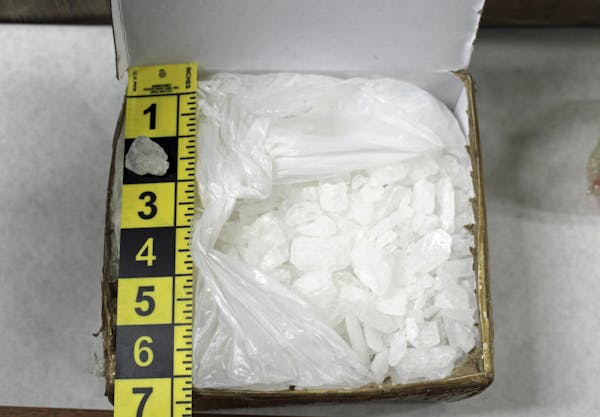Macrina Perez says she tried to pull her boyfriend out of the meth trade after they fell in love and he fathered one of her two children five years ago.
Instead, she claims she became another cog in his drug enterprise, delivering product and acting as an interpreter for a major Mexico-to-Minnesota drug pipeline.
But as she awaits a Jan. 9 sentencing, Perez and her attorney are locked in a struggle with the government over just how deep her role was in a meth cell that included a 140-pound bust at a Brooklyn Center stash house in 2016. Perez, 25, says she abandoned drug trafficking when she left for Mexico four years ago. Yet a veteran narcotics prosecutor in Minnesota called Perez the "CEO of this organization" who, despite her young age, was "as connected to Mexican drug cartels … as anyone I have ever prosecuted."
The arguments swirling around Perez's case represent an intersection of two concurrent trends in the criminal justice system: the saturation of the Upper Midwest with methamphetamine and, as her attorney argued last week in new court filings, the mass incarceration of nonviolent drug offenders who committed their crimes at the behest of far more culpable loved ones.
For Perez, the difference could mean a decade or more in prison.
"I was against this life," Perez said in a statement filed with the court last week. "But I did this voluntarily. Honestly I enjoyed the money he made. I was young and just never comprehended the danger I and my children were in because of this crime."
Agents for the U.S. Drug Enforcement Administration have investigated the cell for at least three years. Three other defendants — including two who operated the stash house at which 140 pounds of meth, cocaine and a firearm were seized — have been sentenced to prison terms ranging from 70 to 96 months after cooperating with the government.
Perez's link to the case was unknown until she was stopped after she made a routine trip across the border this spring to visit her mother in Arizona and to shop at Walmart for toys for her children, who are now being cared for by Perez's mother in Arizona.
Perez has dual U.S.-Mexican citizenship. Because she was still serving probation for a 2013 misdemeanor drunken driving conviction when she was charged in this case, Perez is subject to a 10-year mandatory minimum sentence. Federal authorities have calculated that she should be sentenced to 15 to 20 years in prison. Her attorney, Gary Wolf, is asking Senior U.S. District Judge Ann Montgomery to depart from those guidelines and impose only the minimum required sentence.
Such a ruling would likely be over prosecutors' objections.
"The government disagrees with the defendant's position that she played a minor role in the offense of conviction," Assistant U.S. Attorney David Steinkamp wrote last week in a memo calling for Perez to be sentenced to more than 15 years in prison. "The defendant, conspiring and aiding her husband, was fully involved in the large-scale distribution of methamphetamine originating in Mexico and distributed in Minnesota."
Perez pleaded guilty in August to conspiring to distribute meth, in a deal staving off a trial that could have exposed her to a life sentence. She admitted to transporting almost 100 pounds of meth.
Hers is among a constellation of federal drug cases underscoring how Minnesota has emerged as an essential hub for Mexican cartels pumping pure, cheap meth into the Upper Midwest. At the time, the May 2016 stash-house bust was hailed as the largest ever in Minnesota. But that has since been supplanted by a 191-pound haul in September in north Minneapolis that resulted in federal charges against four men.
It is unclear if charges have also been filed against Perez's boyfriend, who Wolf said is living comfortably in Mexico after making $800,000 dealing meth — none of which was shared with Perez. The Star Tribune is not naming the man because he has not been publicly charged in this case. Wolf said the man declined to contribute to Perez's defense "or to her basic needs at the Sherburne County jail," where Perez has been held since being brought back to Minnesota on April 30. Wolf said Perez has "cut all ties" with the man and she said that she wanted to raise her children in the United States after serving her sentence.
"We sure are wasting a lot of money on people like Macrina who do not need to be incarcerated for 188 months," Wolf said in an interview. "It's the worst of all cases."
The DEA has described the case as "very complex" and with "large networks of individuals and vehicles."
"This is a very, very dangerous situation, and I am not overstating it," Steinkamp said earlier this year at a court hearing over Perez's detention.
Wolf, in contrast, characterized Perez's involvement as an "aberrant incident" and called Perez "a delightful person, always happy, always thinking of her two children."
"I was naive, and motivated by attraction and love, and a desire to have a real family," Perez said in her statement to the court. "But I am ready to face my consequences. … My children are all that matter to me."
Stephen Montemayor • 612-673-1755 Twitter: @smontemayor

Second teen suspect arrested in Minneapolis 'Nudieland' mass shooting that killed 1, injured 6
Charges: Friendly fire killed man standing among group who shot at moving SUV in south Minneapolis

Lakeville public safety training facility gets $800K in federal funding

